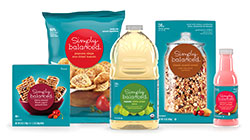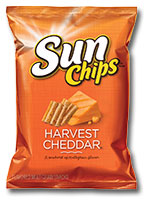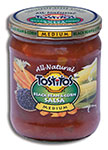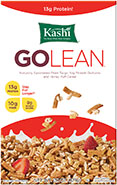Quest for Clean Labels Causes Murky Legal Actions
Consumers at odds with food manufacturers over natural foods with clean labels seek remedies in court.

Natural, minimally processed foods are in demand, but food manufacturers and consumers have conflicting ideas of which ingredients make up natural foods with clean labels. Many consumers believe natural, clean-label foods should contain no artificial ingredients, no chemicals, and nothing unpronounceable. In addition, most consumers equate natural, clean-label foods with good health regardless of whether such foods are actually nutritious and healthful. In contrast, food manufacturers use ingredients such as high fructose corn syrup, sodium molybdate, sucralose, and calcium phosphate in foods labeled natural and all-natural. Because of this difference in interpretation, any food product label touting naturalness or simplicity is subject to scrutiny and challenge. Furthermore, any ingredient with a scientific or chemical-sounding name or that is otherwise unfamiliar may trigger a provocative blog entry by a food activist, a high-profile online petition, or a class-action lawsuit—even if the ingredient is natural. For example, consumers have referred to both ascorbic acid and alphatocopherol, the respective chemical names for vitamin C and vitamin E, in legal petitions for lawsuits challenging whether products are natural. As a consequence, manufacturers of “natural” processed foods made with artificial colors, artificial flavors, flavor enhancers, preservatives, stabilizers, genetically engineered ingredients (GMOs), and other seemingly unnatural elements not available in kitchen cupboards should beware and keep a good attorney on retainer.
What Is Natural?
Perhaps the main cause of the litigious climate surrounding natural and clean-label foods is the inadequate regulatory guidance on what natural means. The U.S. Food and Drug Administration (FDA), which is responsible for regulating all foods except meat, poultry, and eggs, has avoided issuing an official definition for the term. From the FDA’s perspective, determining whether a food is natural is difficult because most foods undergo some form of processing and any food that has been processed is no longer a “product of the earth.” Anthony Pavel, Partner, Morgan, Lewis & Bockius LLP, provides context for the FDA’s viewpoint: “[The Federal Trade Commission] and FDA tried to define natural by rulemaking, and both agencies abandoned those efforts, largely citing resource limitations and other priorities. At its core, [natural] is being used as a marketing term, and issues of food safety will always (and should) take priority at FDA.” However, the FDA has distinguished what it considers unnatural: any food containing added color, artificial flavors, or synthetic substances. The U.S. Dept. of Agriculture has an official definition for natural and the FDA’s vague guidance for the term “natural” closely resembles the USDA’s official definition, which applies only to meat, poultry, and egg products: Meat, poultry, and egg products designated natural must be “minimally processed and contain no artificial ingredients or added color.”
The United States is not alone in its unwillingness to provide a clear, binding definition for the term natural. With the exceptions of France and the United Kingdom, most European countries have not provided a legal definition for the terms “natural” or “clean label.” The Food Standards Agency of the United Kingdom defines a natural product as being comprised of food and ingredients that are “produced by nature, not the work of man or interfered with by man.” The British agency’s definition further expresses that “[i]t is misleading to use the term to describe foods or ingredients that employ chemicals to change their composition” or “additives and flavourings that are the product of the chemical industry or extracted by chemical processes” (FSA, 2008). Interestingly, this definition closely parallels the concept of natural to U.S. consumers but not to U.S. food manufacturers and marketers.
In the absence of government agencies and public policies defining “natural” and “clean label,” various sectors of the food industry have offered interpretations of the concept. For example, Innova Market Insights uses terms such as allergy, gluten-free, low sodium, low sugar, low carb, lactose-free, sugar-free, no added sugar, no additives or preservatives, kosher, and Halal to define a clean label. Most of these terms address public health concerns and cultural or religious requirements but not consumers’ concerns about all-natural, chemical-free ingredients. Ingredion Inc. identifies key elements of clean-label foods as real ingredients consumers recognize, natural and minimally processed, and no additives or preservatives. The ingredient company also created a short list of consumer-approved natural ingredients that includes sugar, glucose, whole grains, natural colors and flavors, starches, and vegetable oils. These and other stakeholders in the food industry may differ in how they interpret natural, clean-label foods, but the consensus across all food industry sectors is that consumers want to see fresh, natural ingredients on short, clear lists.
--- PAGE BREAK ---
Despite the consensus, is the tweaking of ingredients to label products “natural” or “all-natural” prudent? “Sometimes the food industry shoots itself in the foot: [Food companies] label something as natural, which implies that something is wrong with [their] other products,” says Fergus Clydesdale, Distinguished Professor, University of Massachusetts, Amherst. This is especially true when one considers that everything on Earth, including fresh air and water, is made of elements itemized in the periodic table—i.e., chemicals. “If the FDA made a law about listing all of the ingredients for raw foods, there would never be another demand for natural foods [and ingredients] because raw foods are full of chemicals, carcinogens, toxins, etc.—but in very small amounts so they aren’t harmful,” Clydesdale asserts.
 Nevertheless, certain supermarket chains and retail stores have developed lists of unacceptable ingredients that appeal to U.S. consumers who want to purchase natural, chemical-free, minimally processed foods. Whole Foods Market refuses to sell food products containing any of 78 ingredients it considers unacceptable. The list includes artificial colors, artificial flavors, artificial sweeteners (e.g., aspartame, saccharin, and sucralose), azodicarbonamide (the yoga-mat component), bleached or bromated flour, high fructose corn syrup, nitrates/nitrites, and partially hydrogenated oils. Safeway Inc. and the Kroger Co. have created even longer lists of banned ingredients for their respective store brands Open Nature™ and Simple Truth® that include autolyzed yeast extract, caffeine, modified food starch, and tryptophan in addition to the aforementioned ingredients excluded from Whole Foods. Target Brands Inc. also aims to give U.S. consumers what they want by offering its new store brand, Simply Balanced™. In a press release, Target describes the line of foods as a “collection crafted to be free of artificial flavors, colors, and preservatives” as well as high fructose corn syrup. The line provides its customers with “more of the simple, recognizable ingredients they know and want” with food labels “they can understand” (Target Brands, 2013).
Nevertheless, certain supermarket chains and retail stores have developed lists of unacceptable ingredients that appeal to U.S. consumers who want to purchase natural, chemical-free, minimally processed foods. Whole Foods Market refuses to sell food products containing any of 78 ingredients it considers unacceptable. The list includes artificial colors, artificial flavors, artificial sweeteners (e.g., aspartame, saccharin, and sucralose), azodicarbonamide (the yoga-mat component), bleached or bromated flour, high fructose corn syrup, nitrates/nitrites, and partially hydrogenated oils. Safeway Inc. and the Kroger Co. have created even longer lists of banned ingredients for their respective store brands Open Nature™ and Simple Truth® that include autolyzed yeast extract, caffeine, modified food starch, and tryptophan in addition to the aforementioned ingredients excluded from Whole Foods. Target Brands Inc. also aims to give U.S. consumers what they want by offering its new store brand, Simply Balanced™. In a press release, Target describes the line of foods as a “collection crafted to be free of artificial flavors, colors, and preservatives” as well as high fructose corn syrup. The line provides its customers with “more of the simple, recognizable ingredients they know and want” with food labels “they can understand” (Target Brands, 2013).
Are GMO Foods Natural?
In addition to offering brands with labels that are free from artificial ingredients, chemicals, and partially hydrogenated oils, these stores are capitalizing on consumers’ fear and loathing of GMOs—a detail most food manufacturers developing natural, clean-label food products try to ignore. Thanks to the plethora of non-authoritative misinformation on the Internet, many consumers earnestly believe that genetic engineering of plants is unsafe and a relatively new technology designed to deliver “frankenfoods” to the unsuspecting public. For example, the website for Non-GMO Project states, “A growing body of evidence connects GMOs with health problems, environmental damage, and violation of farmers’ and consumers’ rights” (NGMOP, 2014). And the Institute for Responsible Technology warns on its website that “numerous health problems increased after GMOs were introduced in 1996” and that the incidence of chronic illness “jumped from 7% to 13%” (IRT, 2013). The official-looking website also claims, “[T]he very process of creating [GMOs] can result in massive collateral damage that produces new toxins, allergens, carcinogens, and nutritional deficiencies,” linking the consumption of GMOs to autism, reproductive disorders, and digestive problems.
Misinformation about genetic engineering of plants and crops perpetuates the stigma that GMOs are unsafe and fuels the movement for mandatory labeling of all GMOs and foods containing genetically engineered ingredients. The truth is that plants and crops have undergone various forms of genetic manipulation for centuries: “From a scientific point of view, everything we eat has been modified genetically over the years whether it is done by nature, by scientists’ inducing pollination, or by transferring and inserting genes. [Gregor] Mendel, the father of genetics, worked on pea plants, and he discovered the science of genetics by breeding [via] cross-pollination. This work took Mendel eight years, and now we can do it a lot faster,” says Clydesdale. The main difference is that with GMOs, the genetic manipulation occurs in a laboratory and may involve a gene from an organism other than a plant from the same class, family, and genus. More importantly, an abundance of scientific research by biotechnology companies as well as independent researchers not affiliated with the biotechnology industry has determined that GMOs are safe for consumption. Accordingly, the FDA considers the safety of GMOs a scientific certainty and has no intention of requiring special labels for them: “When we require a label on something, we’re either warning there’s a potential safety problem or we’re giving nutritional information. GMO labeling doesn’t fit. There’s not a safety issue, and it doesn’t affect nutrition,” says Tom Vilsack, U.S. Secretary of Agriculture (Ball, 2014).
Whole Foods, Safeway, Kroger, and Target along with the manufacturers of brands such as Kashi®, Bear Naked®, Nature Valley®, SunChips®, Tostitos®, and other products marketed as natural, all-natural, or GMO-free appear to be offering the simple, clean-label products that U.S. consumers want and are willing to pay premium prices for. However, consumers are not so easily assuaged by comprehensive lists of banned ingredients and the words “natural” and “simple” on the front of packages. Food activists, consumer advocacy groups, and nongovernmental organizations are scrutinizing the fine print on product labels and filing court petitions if a product’s ingredient list contains corn or soy products and words that look suspicious or unpronounceable. When it comes to which food products and ingredients are natural, “manufacturers have to contend with the old slogan ‘the customer is always right,’” says Pavel. Certain ingredients in particular seem to be catalysts for numerous class-action lawsuits: artificial preservatives, GMOs, high fructose corn syrup, and ingredients processed with chemicals.
Suing the Unnatural
General Mills Inc. is defending itself against three class-action lawsuits initiated by the Center for Science in the Public Interest and others for what the plaintiffs consider deceptive labeling and marketing practices. The suits allege that the company markets and labels Nature Valley products as “100% natural” when, in fact, the products contain GMOs, high fructose corn syrup, and other highly processed artificial ingredients. Arguing that the FDA, not a court, should determine whether its products are natural, General Mills initially tried to have the cases dismissed in 2013, but a California judge denied the company’s request, stating, “In repeatedly declining to promulgate regulations governing the use of ‘natural’ as it applies to food products, the FDA has signaled a relative lack of interest in devoting its limited resources to what it evidently considers a minor issue” (Pierce, 2013). For its second attempt to have the cases dismissed in 2014, General Mills contended that any reasonable consumer should know that industrially produced shelf-stable granola bars were not made entirely of natural ingredients. Another California judge denied the company’s request, explaining that the prominent placement of the term “100% natural” on product packaging “could lead a reasonable consumer to believe that the products contain only natural ingredients” (Davis, 2014). The cases are still pending.
--- PAGE BREAK ---

 The past two and a half years have been particularly litigious for Frito-Lay North America Inc., a subsidiary of PepsiCo Inc. The snack company has been slapped with four class-action lawsuits since December 2011— three of which refer to the natural and all-natural claims on the labels of Frito-Lay products. Two of the suits contend that certain Tostitos® and SunChips® snacks with labels declaring all-natural ingredients are fraudulent because the corn and vegetable oil used to make the snacks are the products of GMOs. To support this claim, one of the plaintiffs refers to a definition for genetically engineered plants on the website of the biotechnology firm Monsanto Co., which states that GMOs are “plants or animals that have had their genetic makeup altered to exhibit traits that are not naturally theirs” (emphasis added) (Monsanto Co., 2014). The plaintiff was therefore “damaged … because she did not get the ‘all natural’ Tostitos and SunChips products that were advertised and that she paid for.” The third lawsuit makes similar GMO allegations about Frito-Lay Bean Dip because of its soy-based ingredients. None of these cases has been resolved, and Frito-Lay’s efforts to have the cases dismissed have been futile.
The past two and a half years have been particularly litigious for Frito-Lay North America Inc., a subsidiary of PepsiCo Inc. The snack company has been slapped with four class-action lawsuits since December 2011— three of which refer to the natural and all-natural claims on the labels of Frito-Lay products. Two of the suits contend that certain Tostitos® and SunChips® snacks with labels declaring all-natural ingredients are fraudulent because the corn and vegetable oil used to make the snacks are the products of GMOs. To support this claim, one of the plaintiffs refers to a definition for genetically engineered plants on the website of the biotechnology firm Monsanto Co., which states that GMOs are “plants or animals that have had their genetic makeup altered to exhibit traits that are not naturally theirs” (emphasis added) (Monsanto Co., 2014). The plaintiff was therefore “damaged … because she did not get the ‘all natural’ Tostitos and SunChips products that were advertised and that she paid for.” The third lawsuit makes similar GMO allegations about Frito-Lay Bean Dip because of its soy-based ingredients. None of these cases has been resolved, and Frito-Lay’s efforts to have the cases dismissed have been futile.
 Kellogg Co. recently agreed to settle several class-action lawsuits filed because certain Kashi® products and Bear Naked® products were labeled all-natural, pure, and free of artificial ingredients. One of the plaintiffs alleged that Kashi Co., a subsidiary of Kellogg Co., “inserted a spectacular array of unnaturally processed and synthetic ingredients to its so-called ‘all-natural’ products,” including prescription drugs, irradiated substances, and items declared hazardous by federal regulations (Pierce, 2011). Kellogg Co. attempted to have one of the cases dismissed in 2012 by claiming that, among other things, the terms “all-natural” and “nothing artificial” were too vague and subjective and thus not suitable for legal dispute. A California judge rejected this argument and allowed the case to proceed under the California Consumer Protection Law. The terms of the May 2014 settlement indicate that Kellogg Co. will remove the terms “all natural” and “nothing artificial” from the labels of certain Kashi products and “100% natural” and “100% pure and natural” from certain Bear Naked products. In addition, the company will set aside $5 million to reimburse Kashi customers and $325,000 to reimburse Bear Naked customers.
Kellogg Co. recently agreed to settle several class-action lawsuits filed because certain Kashi® products and Bear Naked® products were labeled all-natural, pure, and free of artificial ingredients. One of the plaintiffs alleged that Kashi Co., a subsidiary of Kellogg Co., “inserted a spectacular array of unnaturally processed and synthetic ingredients to its so-called ‘all-natural’ products,” including prescription drugs, irradiated substances, and items declared hazardous by federal regulations (Pierce, 2011). Kellogg Co. attempted to have one of the cases dismissed in 2012 by claiming that, among other things, the terms “all-natural” and “nothing artificial” were too vague and subjective and thus not suitable for legal dispute. A California judge rejected this argument and allowed the case to proceed under the California Consumer Protection Law. The terms of the May 2014 settlement indicate that Kellogg Co. will remove the terms “all natural” and “nothing artificial” from the labels of certain Kashi products and “100% natural” and “100% pure and natural” from certain Bear Naked products. In addition, the company will set aside $5 million to reimburse Kashi customers and $325,000 to reimburse Bear Naked customers.

Augmenting the divergent interpretations of what constitutes clean-label food and who can be sued for offering premium natural products, consumers and consumer advocacy groups are not only filing lawsuits against big food companies with popular name brands. Whole Foods Market is the defendant in a class-action lawsuit filed in California last year; the suit alleges that the grocer’s all-natural baked goods (in particular, mini muffins, soft-baked cookies, and gluten-free bakery items) contain synthetic ingredients. Whole Foods Market’s motion to have the case dismissed was denied last month. The Kroger Co. is the defendant in a recently filed lawsuit that alleges the chickens used for its Simple Truth® premium-priced chicken products are not raised cage-free in a humane environment as advertised on package labels. In addition, Trader Joe’s Co. recently announced a $3.375 million settlement to resolve a lawsuit alleging that the grocery chain falsely marketed as 100% natural some of its store-brand foods that contained synthetic ingredients such as sodium acid pyrophosphate, xanthan gum, cocoa processed with alkali, and ascorbic acid. Without admitting to having done anything unlawful or misleading, Trader Joe’s Co. will remove the phrases “all natural” and “100% natural” from the labels of the products named in the lawsuit.
For companies in the food industry, not being served with papers announcing a lawsuit is no guarantee that their product labels are beyond scrutiny. Indeed, even products not claiming to be natural, simple, or pure are subject to food activists. Doctor’s Associates Inc., which advertises its Subway® sandwiches as fresh (the brand’s tagline is “eat fresh”), not natural, was the target of a recent online campaign to remove the food and yoga mat ingredient azodicarbonamide from the sandwich chain’s bread products. In May 2014 Coca-Cola Co. and PepsiCo Inc. announced plans to remove brominated vegetable oil from their respective sports drinks, Powerade and Gatorade, after two petitions on Change.org received more than 200,000 signatures. The FDA considers both azodicarbonamide and brominated vegetable oil to be safe for specific uses in food; however, brominated vegetable oil is not on the FDA’s list of additives that are generally recognized as safe.
--- PAGE BREAK ---
A Natural Solution
Although food manufacturers would like to designate which products in their portfolios are natural with clean labels, contentious consumers will not allow them to do so. Food activists, consumer advocacy groups, and nongovernmental organizations have taken the terms “natural,” “all-natural,” and “simple,” and turned them into what they want them to be. Moreover, some courts are giving credence to consumers’ idiosyncratic beliefs, further muddying interpretations of what’s natural and which ingredients shouldn’t appear on clean labels. “These are the courts where state-based consumer fraud causes of action have been getting traction, which in turn [spurs] additional lawsuits in those courts. A court where similar cases have made it past a motion to dismiss will be favored by the plaintiff’s bar,” Pavel explains. In addition, such lawsuits “are based on accusations that the company has violated a state’s consumer protection law rather than federal law or regulation,” says Eric Greenberg, Principal Attorney, Eric F. Greenberg P.C.
In an ideal judiciary scenario, lawsuits involving food label features not regulated by the FDA or the USDA would be dismissed or otherwise fail, but there is really only one way to be sure: “The easiest way is to not use natural claims,” says Pavel. For those determined to use the terms “natural,” “clean,” or “simple,” “companies need to look at any product that bears a natural claim and perform a farm-to-fork analysis of that product to shore up the basis and justification for the claim. I would also recommend monitoring the status of ongoing litigation to identify what products/ingredients are being targeted and which lawsuits are getting past a motion to dismiss,” Pavel says. “It is important to put yourself in the shoes of a consumer that has zero understanding of food science and ask, ‘Would the claims on this result in confusion or misunderstanding?’” he adds. Although these precautionary steps can delay or lengthen the product development process, they are essential because “plaintiffs’ theories are often rather creative and do not match up with what federal regulations consider acceptable or unacceptable,” says Greenberg.
In addition, it may be wise to avoid labeling anything made with genetically engineered ingredients as natural. Despite the fact that more than 70% of processed foods contain GMOs, Vermont’s recent statutory requirement for the labeling of foods with GMO ingredients is likely a harbinger of what’s to come. The Vermont law and ones similar to it have “set the stage for an unmanageable patchwork of labeling requirements across the U.S.,” Pavel says. Without any official clarification on these issues from the FDA, food companies can expect to incur extra costs for creating different labels for identical products being sold in different states (e.g., GMO labels in Vermont) and fending off lawsuits over natural, clean-label foods. “Happily for the companies, these cases do not always succeed,” Greenberg says.
Toni Tarver is Senior Writer/Editor for Food Technology magazine ([email protected]).
References
Ball, M. 2014. Want to know if your food is genetically modified? The Atlantic, May 14. http://www.theatlantic.com/features/archive/2014/05/want-to-know-if-your-food-is-genetically-modified/370812/. Accessed June 5, 2014.
Davis, C. 2014. General Mills can’t escape Nature Valley class action lawsuits. Top Class Actions. http://www.topclassactions.com/lawsuit-settlements/lawsuit-news/21617-general-mills-cant-escape-nature-valley-class-action-lawsuits/. Accessed June 5, 2014.
FSA. 2008. Criteria for the use of the terms fresh, pure, natural, etc. Food Standards Agency, London, England. http://multimedia.food.gov.uk/multimedia/pdfs/markcritguidance.pdf. Accessed June 5, 2014.
IRT. 2013. 10 reasons to avoid GMOs. Institute for Responsible Technology. http://www.responsibletechnology.org/10-Reasons-to-Avoid-GMOs. Accessed June 5, 2014.
Monsanto Co. 2014. Glossary: genetically modified organisms (GMO). http://www.monsanto.com/newsviews/pages/glossary.aspx#g. Accessed June 5, 2014.
NGMOP. 2014. GMO facts: frequently asked questions. Non-GMO Project. http://www.nongmoproject.org/learn-more/. Accessed June 5, 2014.
Pierce, S. 2011. Kashi false advertising class action lawsuit. Top Class Actions. http://www.topclassactions.com/lawsuit-settlements/lawsuit-news/1344-kashi-false-advertising-class-action-lawsuit/. Accessed June 5, 2014.
Pierce, S. 2013. General Mills must face Nature Valley class action lawsuit. Top Class Actions. http://www.topclassactions.com/lawsuit-settlements/lawsuit-news/4121-general-mills-must-face-nature-valley-class-action-lawsuit/. Accessed June 5, 2014.
Target Brands Inc. 2013. Target introduces new grocery wellness brand, Simply Balanced™. http://pressroom.target.com/news/target-introduces-new-grocery-wellness-brand-simply-balancedTM. Accessed June 5, 2014.